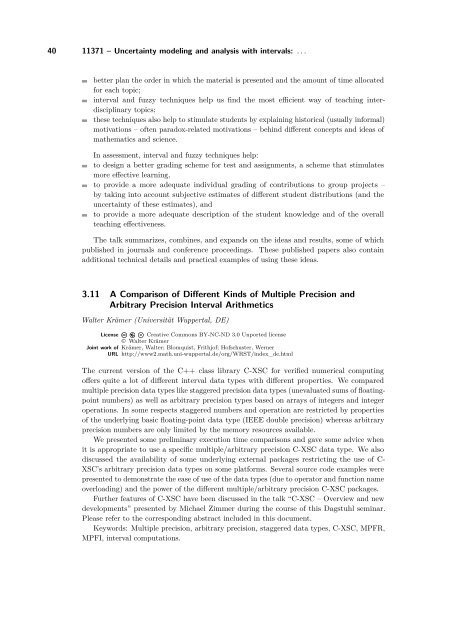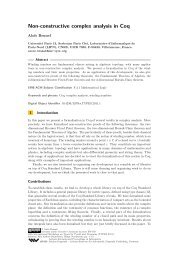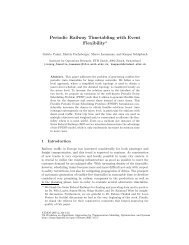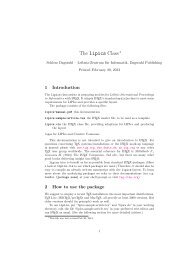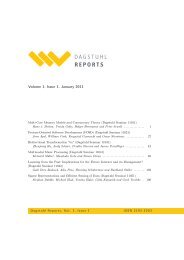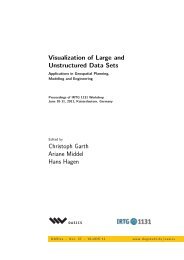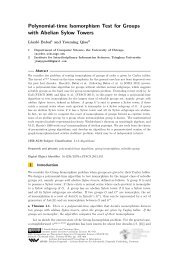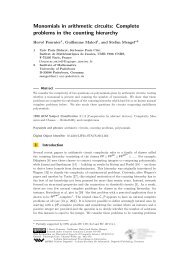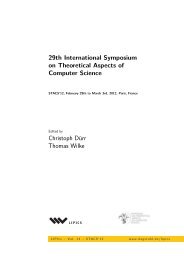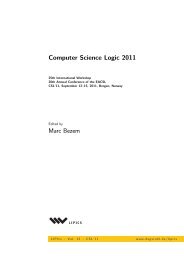Uncertainty modeling and analysis with intervals - DROPS - Schloss ...
Uncertainty modeling and analysis with intervals - DROPS - Schloss ...
Uncertainty modeling and analysis with intervals - DROPS - Schloss ...
You also want an ePaper? Increase the reach of your titles
YUMPU automatically turns print PDFs into web optimized ePapers that Google loves.
40 11371 – <strong>Uncertainty</strong> <strong>modeling</strong> <strong>and</strong> <strong>analysis</strong> <strong>with</strong> <strong>intervals</strong>: . . .<br />
better plan the order in which the material is presented <strong>and</strong> the amount of time allocated<br />
for each topic;<br />
interval <strong>and</strong> fuzzy techniques help us find the most efficient way of teaching interdisciplinary<br />
topics;<br />
these techniques also help to stimulate students by explaining historical (usually informal)<br />
motivations – often paradox-related motivations – behind different concepts <strong>and</strong> ideas of<br />
mathematics <strong>and</strong> science.<br />
In assessment, interval <strong>and</strong> fuzzy techniques help:<br />
to design a better grading scheme for test <strong>and</strong> assignments, a scheme that stimulates<br />
more effective learning,<br />
to provide a more adequate individual grading of contributions to group projects –<br />
by taking into account subjective estimates of different student distributions (<strong>and</strong> the<br />
uncertainty of these estimates), <strong>and</strong><br />
to provide a more adequate description of the student knowledge <strong>and</strong> of the overall<br />
teaching effectiveness.<br />
The talk summarizes, combines, <strong>and</strong> exp<strong>and</strong>s on the ideas <strong>and</strong> results, some of which<br />
published in journals <strong>and</strong> conference proceedings. These published papers also contain<br />
additional technical details <strong>and</strong> practical examples of using these ideas.<br />
3.11 A Comparison of Different Kinds of Multiple Precision <strong>and</strong><br />
Arbitrary Precision Interval Arithmetics<br />
Walter Krämer (Universität Wuppertal, DE)<br />
License Creative Commons BY-NC-ND 3.0 Unported license<br />
© Walter Krämer<br />
Joint work of Krämer, Walter; Blomquist, Frithjof; Hofschuster, Werner<br />
URL http://www2.math.uni-wuppertal.de/org/WRST/index_de.html<br />
The current version of the C++ class library C-XSC for verified numerical computing<br />
offers quite a lot of different interval data types <strong>with</strong> different properties. We compared<br />
multiple precision data types like staggered precision data types (unevaluated sums of floatingpoint<br />
numbers) as well as arbitrary precision types based on arrays of integers <strong>and</strong> integer<br />
operations. In some respects staggered numbers <strong>and</strong> operation are restricted by properties<br />
of the underlying basic floating-point data type (IEEE double precision) whereas arbitrary<br />
precision numbers are only limited by the memory resources available.<br />
We presented some preliminary execution time comparisons <strong>and</strong> gave some advice when<br />
it is appropriate to use a specific multiple/arbitrary precision C-XSC data type. We also<br />
discussed the availability of some underlying external packages restricting the use of C-<br />
XSC’s arbitrary precision data types on some platforms. Several source code examples were<br />
presented to demonstrate the ease of use of the data types (due to operator <strong>and</strong> function name<br />
overloading) <strong>and</strong> the power of the different multiple/arbitrary precision C-XSC packages.<br />
Further features of C-XSC have been discussed in the talk “C-XSC – Overview <strong>and</strong> new<br />
developments” presented by Michael Zimmer during the course of this Dagstuhl seminar.<br />
Please refer to the corresponding abstract included in this document.<br />
Keywords: Multiple precision, arbitrary precision, staggered data types, C-XSC, MPFR,<br />
MPFI, interval computations.


